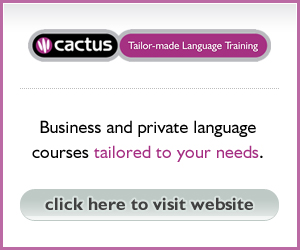Cactus TEFL Speaks Out !
Wednesday, 4th March 2009

With so many different organisations and bodies comprising an industry as unregulated as that of TEFL, it is inevitable that some will be more reputable than others.
It is perhaps understandable therefore that so many provoke a good deal of suspicion and mistrust amongst both existing and potential EFL teachers.
A good number of industry bodies and companies are, however, trustworthy, including Cactus TEFL. We work hard giving hours of advice to the would-be TEFLers who consult us and we have enjoyed some excellent, grateful feedback from them. We are proud to provide a service that aims to de-mystify the aspects of TEFL that are most often confused, and believe that we are one of the few companies who attempt to do this. Our service, in addition, is entirely free to the TEFL course customer.
Unfortunately, in certain public forums we find ourselves accused of questionable practice especially over our ethics, aims and working practices. We feel we need to respond! We are loath however to respond in these public forums ourselves as we feel part of their aim is to goad and bully with no constructive outcome.
Here are some statements about us which have not previously been published, and which we hope will clarify some of the things which most frequently come under suspicion!
Cactus TEFL & The Guardian
The relationship between Cactus and the Guardian started about 5 years ago. It began because the pre-existing Guardian TEFL micro-site under Education Guardian met the needs of existing teachers of English, but had no information for those considering teaching English as a Foreign Language as newcomers to the industry.
Initially, Cactus provided the Guardian with a string of articles covering aspects such as “what it’s like to work in TEFL”, “What the different qualifications are about”, and “What to expect from the TEFL job”.
Cactus now proposes articles to the Guardian about a wide range of TEFL related issues, which are either accepted or declined by Education Guardian’s editors. These range from updates about Cactus TEFL products and services, to general industry comments, such as articles on rates of pay, and issues from within the industry.
Cactus also pays an annual fee to advertise on the site, in the form of the large search box onsite, and also for advertisements in the Guardian newspaper which promotes Cactus TEFL’s Information Evenings.
How can Cactus TEFL be impartial?
Cactus is one of the UK’s leading language training organisations, and with some 15,000 students taking language courses in the UK and overseas each year, we’re probably the largest provider of face-to-face language training.
Cactus is a for-profit organisation, but the teacher training arm, Cactus TEFL, was set up predominantly to provide better information, clarity and transparency to those of us searching for a TEFL course. Cactus makes its money by receiving a small commission from every course place it organises, just as online insurance comparison sites or other price comparison sites work. This commission is not available to the general public, which means the price we list on our website, is the price you would pay the school if you went directly. This means that essentially our free advice, and very personal customer service makes the critical difference, so that everyone benefits.
The profits we make are ploughed back into Cactus TEFL, allowing us to provide more guidance, publications and other support documents.
We have tried to amass as many course offerings of different types of TEFL programme as possible. When you phone, the team will listen actively to your needs, and do their best to recommend a course. This includes recommending other sources of information or course listings, if you don’t find what you want on our site. We will always try and recommend the best course for your requirements and it is of no consequence to us which course you choose. In this sense, we are impartial. We have our own opinions about TEFL courses, which we will share with you if you want us to.
What about the integrity of Cactus TEFL’s course offering?
In 2001 when Cactus TEFL started its admissions service, we only promoted the ‘top’ initial-level TEFL courses in the form of the Cambridge CELTA & Trinity Cert TESOL courses. Even at that point in time, many people were travelling overseas on gap year experiences, finding work teaching English, but with no course whatsoever behind them. At the same time, a number of independent course providers – generally run by people who themselves had taught using a CELTA or CertTESOL qualification – began offering shorter, lighter TEFL courses which were cheaper and which didn’t require people to quit their work for 4 weeks to take a course, ahead of possibly leaving their work to travel around the world. These courses became very popular and it was felt that CactusTEFL, by sticking to the 4-week, 120-hour intensive courses, was no longer representing the whole TEFL course market, and so Cactus TEFL began to talk about these shorter courses too.
To some people already working in the TEFL industry - staunch proponents of 4-week courses, and anyone who had taken an externally validated Trinity or Cambridge course and gone on to teach English – Cactus TEFL “sold its soul to the devil” in offering these shorter courses. However CactusTEFL has consistently remained an advocate of the full-time, intensive TEFL courses which last 4-5 weeks. We still very much consider short weekend or online course TEFL courses to be only very basic introductions to teaching.
Why did you bring out your own online TEFL course?
We are still the first people to agree that doing an online course is not as good as being in a school, with other people, and following a 4-week intensive course. The fact remains, nevertheless, that we’d prefer for people to have some sort of course behind them, than no course at all, and any preparation is better than none.
Over the years, the team at Cactus TEFL have listened to many thousands of future TEFL teachers commenting on their needs and requirements, and how these have to be juxtaposed with finite time and financial resources. Our first response to this was the ELA course – the online English Language Awareness course, designed to help people gain a better understanding of English grammar ahead of taking a 4-week course. This was because many people were intimidated by the need to know the English language properly before even applying for a 4-week TEFL course. The resulting course has been a great success in responding to the need.
On analysing what was available in the market, it seemed that no other online course took this view that it’s better to top up your English language skills before you go about trying to teach the language. Even 4-week intensive courses will teach you grammar on one day, and then expect you to understand this, synthesize the information, and the next day, be prepared to stand up and teach it back to students in your teaching practice.
Although still available as a stand-alone product, the ELA course is now also embedded in our second online training course – the Cactus Online TEFL Course. This course consists of a very respectable 135 hours of training, but still differs from other online courses in terms of its format, its construction and also its heavy focus on English Grammar (thanks to the ELA component).
Whilst we believe that at 135 hours, this is a substantial course, we are the first to remind students that it is “only” an online course, and no substitute for a chunkier CELTA or CertTESOL course with 120 hours of face-to-face, hands on, real, live tuition.
Supporting an industry that underpays skilled English teachers
Once you’ve got through your TEFL course, you’ve still got to find the right job. Teaching English abroad is notoriously poorly paid, and the work is often likened to the hotel & catering industry. Replace the physical intensity with a mental one, and you’re not too far off. Management will often give you awkward split teaching shifts, ram lessons together back-to-back, giving you very little time to turn lessons around, and preparation for lessons often is expected to take place in your own time. In fact this is one very good reason to do an excellent, detailed course – because if you don’t, you won’t really build up the ability to prepare lessons efficiently. That means if you have the conscience to do a good job of teaching English, you’re likely to end up spending all your spare time preparing.
Cactus also provides language training, and generally pays its trainers a minimum of £20 per hour, and often much more in the case of rare languages in unusual locations. However, you often hear stories of teachers earning little more than the minimum wage, for what is deemed substantially more high-brow work. Cactus TEFL works by helping to prepare future teachers for the reality of what it’s like to teach abroad. Many of us at Cactus have experienced first-hand some of the industry ‘sharks’ charging clients top whack, and paying their teachers a pittance. It’s true if you’re doing it for the money, you’re in the wrong industry. What TEFL does give you, is amazing, unique, unforgettable adventures in other countries and cultures. We’ve certainly found that the issues encountered with schools pale into insignificance compared with the lovely students you encounter, their appreciation of what you provide them with, and the personal journey you experience – with good and bad. Generally you come back home more resilient, more confident, more vocal and much better at dealing with people. The memories of life abroad – rough and smooth - of living in very close proximity to a new culture also provide for a lifetime of anecdotes.
Tags: 4-week tefl course or equivalent, tesol, cactus tefl, celta, efl, course, language, cactus, location, tefl, culture, english
